out of "songs, facts, and legends" which she has collected
and illustrated. Her first intimate acquaintance with the robin was made, she tells us, during her recovery from illness. Many birds came to her garden; but none which made themselves so much at home and were so friendly as the robins. But though Lady Lindsay came to like her fearless little visitors very much, she does not permit herself any illusions about their character. She found them quite as quarrelsome as common report describes them to be ; indeed, their sweetest and most pleasing song she found, by observation, to be a challenge to battle. One whom
Lady Lindsay kept in a cage would fly at his own reflection in the glass. The bright side of this pugnacity is the extraordinary
boldness and confidence which the bird displays in his intercourse with man. This has, so to speak, made his fortune. Poets sing of him, and what is more important, men in general hold his life sacred. There are, of course, exceptions. The French, whose table spares nothing, eat "this affectionate little songster with breadcrumbs," as Buffon puts it; and even in England, where the rudest village boy would not harm him, female vanity, not less merciless than masculine gluttony, sacrifices him to be the ornament of a head-dress. "For my part," writes Lady Lindsay with laudable energy, "I would as lief wear a stuffed village child." An interesting collection of poems, beginning with Chaucer in "The Assembly of Ponies," is added.


















































 Previous page
Previous page